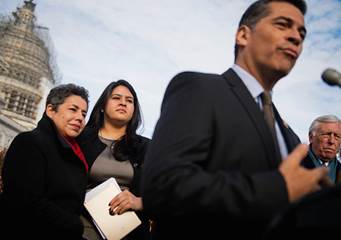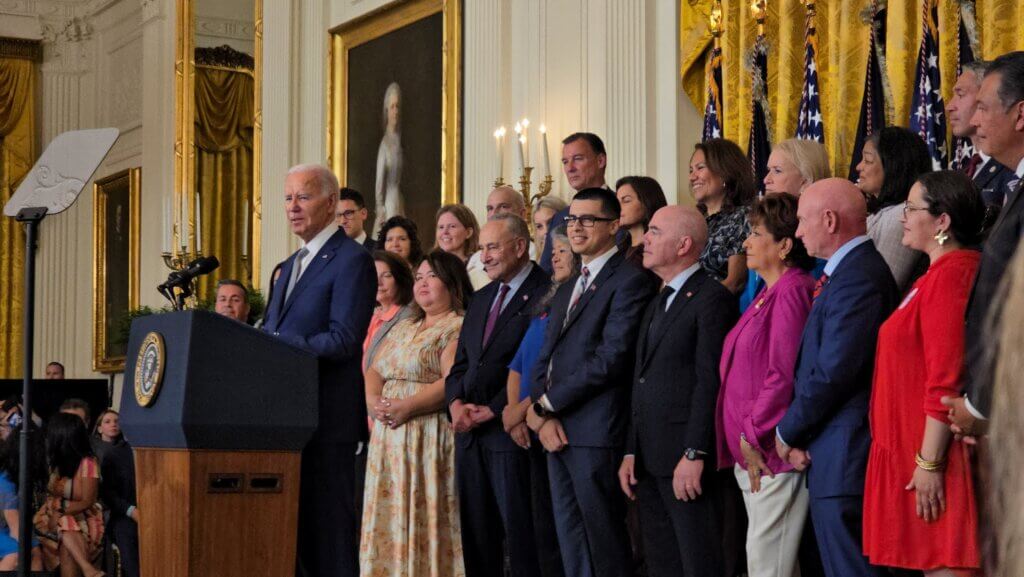This Week in Immigration Reform — Week Ending Dec. 5
Week Ending December 5
This week in immigration reform: the House of Representatives denounces the president’s recently announced executive action; new polling data demonstrates support for the purpose of executive action; Charles Kamasaki solidifies the comparison of executive action taken by President Bush and President Obama; and NCLR highlights the economic benefit of administrative relief.
NCLR kept the community informed on immigration with staff quoted in Wall Street Journal, The Associated Press, and The Huffington Post.
In final days of the 113th Congress, House Republicans opt to attack millions of American families with symbolic vote on administrative relief: This week, House Republicans held two hearings focused on the legality of executive action and reiterated rhetoric that President Obama “poisoned the well” on comprehensive immigration reform.
On Thursday, the House of Representatives passed the “Preventing Executive Overreach on Immigration Act of 2014” (H.R. 5759), a symbolic bill to inhibit the execution of President Obama’s executive actions. The bill passed 219–197. In our press statement Janet Murguia said, “Today, House Republicans had yet another opportunity to demonstrate leadership on immigration. Instead, they confirmed that they have no intention of acting on this issue, opting for a symbolic vote that embraces a draconian, unworkable mass deportation strategy and attacks the only semblance of progress we have made in more than two decades.”
On the morning of the vote, House Democratic leadership and advocates urged House Republicans to focus on fixing our broken immigration system at a press conference. House Minority Leader Nancy Pelosi (D-Calif.), Representative Steny Hoyer (D-Md.), and Representative Xavier Becerra (D-Calif.) also urged House Republicans to work on repairing our immigration system instead of on taxpayer resources on messaging bills, like H.R. 5759, and political posturing.

Clarissa Martinez-De-Castro of the National Council of La Raza, Lorella Praeli of United We Dream, House Democratic Caucus Chairman Xavier Becerra, and House Minority Whip Steny Hoyer attend a news conference at the House Triangle, December 4, 2014. (Photo By Tom Williams/CQ Roll Call)
Next week Congress will likely have votes on how to fund federal agencies beyond December 11, 2014. Discussions currently include possibly voting on a bill that could fund all federal agencies through fiscal year 2015, except the Department of Homeland Security (DHS) which would be funded short-term and brought up again next year. Next Wednesday, the Senate Judiciary Committee is holding a hearing on administrative relief. Stay tuned to our blog for updates.
New polls show Americans support goals of executive action: A recent CNN poll found that 50 percent of Americans think Obama’s plan for undocumented immigrants is about right, with 22 percent saying it doesn’t go far enough. Another 76 percent of respondents said Republicans should spend more time passing comprehensive immigration reform than attempting to overturn President Obama’s policies. Americans are increasingly concerned about undocumented immigrants and their families, with the poll showing 75 percent of Americans feel sympathetic toward those immigrants, up from 67 percent in 2011 and 52 percent in 2010.
Another poll found 72 percent of Americans favor the substance of the president’s Deferred Action for Parental Accountability (DAPA) program when asked how they felt about allowing “illegal immigrants who are the parents of children with legal status to stay in the U.S. for three years without being subject to deportation, if they pass a background check and have lived in the country for at least five years.” Provisions like the DREAM Act continue to garner strong support, with 64 percent favoring allowing those brought to the U.S. as children to gain legal status if they have served in the military or are enrolled in college.
NCLR continues to demonstrate the long-standing historical precedent for administrative relief: When questioning the legitimacy and legality of President Obama’s recent executive action on immigration, some claim actions taken by the president are “unprecedented,” even though every president since President Eisenhower has used prosecutorial discretion to shield immigrants from deportation.
NCLR’s Charles Kamasaki wrote a rebuttal to a recent Washington Post Fact Checker blog post that claims there is no precedent for the president’s action because those taken by others, like President Bush, are incomparable in scope. Kamasaki writes, “At issue is whether President Obama’s action to cover approximately 40 percent of the 11.1 million undocumented immigrants in the United States is comparable to an action by George H.W. Bush in 1990, which extended similar protections to 1.5 million undocumented spouses and children of applicants for the legalization programs authorized by the Immigration Reform and Control Act of 1986.”
Read Kamasaki’s piece, in which he concludes, “whether looking at the relative scope of the action, or with respect to congressional intent, the two situations are almost exactly analogous. As the Post editorial notes, ―facts matter— even in Washington —and so do numbers. It would do well to heed its own advice.”
NCLR highlights the economic benefits of executive action on immigration: Administrative relief will not only allow American families to live without the fear of separation, but it will also benefit all American workers and the U.S. economy. Our blog post notes that the issuance of work permits and the deferral of deportation will boost immigrant earnings and thus increase tax revenues, including the millions of dollars undocumented immigrants already contribute to the Social Security Administration. Additionally, work authorization enables immigrants to demand fair labor practices, decreasing exploitation of all American workers and increasing accountability of U.S. employers. The president’s actions brighten the economic outlook and improve our economy.



